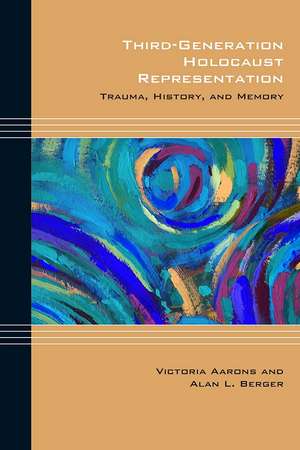Third-Generation Holocaust Representation: Trauma, History, and Memory: Cultural Expressions
Autor Victoria Aarons, Alan L. Bergeren Limba Engleză Paperback – 14 ian 2017
Victoria Aarons and Alan L. Berger show that Holocaust literary representation has continued to flourish well into the twenty-first century—gaining increased momentum even as its perspective shifts, as a third generation adds its voice to the chorus of post-Holocaust writers. In negotiating the complex thematic imperatives and narrative conceits of the literature of third-generation writers, this bold new work examines those structures, tropes, patterns, ironies, disjunctions, and overall tensions that produce a literature that laments unrecoverable loss for a generation removed spatially and temporally from the extended trauma of the Holocaust. Aarons and Berger address evolving notions of “postmemory”; the intergenerational and ongoing transmission of trauma; issues of Jewish cultural identity; inherited memory; the psychological tensions of post-Holocaust Jewish identity; the characteristic tropes of memory and the personalized narrative voice; issues of generational dislocation and anxiety; the recurrent antagonisms of assimilation and historical alienation; the imaginative re-creation and reconstruction of the past; and the future of Holocaust memory and representation.
Preț: 267.20 lei
Preț vechi: 305.59 lei
-13% Nou
Puncte Express: 401
Preț estimativ în valută:
51.13€ • 53.53$ • 42.31£
51.13€ • 53.53$ • 42.31£
Carte indisponibilă temporar
Doresc să fiu notificat când acest titlu va fi disponibil:
Se trimite...
Preluare comenzi: 021 569.72.76
Specificații
ISBN-13: 9780810134096
ISBN-10: 0810134098
Pagini: 280
Ilustrații: 4 b-w images
Dimensiuni: 152 x 229 x 20 mm
Greutate: 0.38 kg
Editura: Northwestern University Press
Colecția Northwestern University Press
Seria Cultural Expressions
ISBN-10: 0810134098
Pagini: 280
Ilustrații: 4 b-w images
Dimensiuni: 152 x 229 x 20 mm
Greutate: 0.38 kg
Editura: Northwestern University Press
Colecția Northwestern University Press
Seria Cultural Expressions
Notă biografică
VICTORIA AARONS is O. R. and Eva Mitchell Distinguished Professor of Literature and chair of the English Department at Trinity University.
ALAN L. BERGER holds the Raddock Family Eminent Scholar Chair for Holocaust Studies and is a professor of Judaic studies at Florida Atlantic University.
Cuprins
Acknowledgments
Chapter 1
On the Periphery: The “Tangled Roots” of Holocaust Remembrance for the Third Generation
Chapter 2
The Intergenerational Transmission of Memory and Trauma: From Survivor Writing to Post-Holocaust Representation
Chapter 3
Third-Generation Memoirs: Metonymy and Representation in Daniel Mendelsohn’s The Lost
Chapter 4
Trauma and Tradition: Changing Classical Paradigms in Third-Generation Novelists
Chapter 5
Nicole Krauss: Inheriting the Burden of Holocaust Trauma
Chapter 6
Refugee Writers and Holocaust Trauma
Chapter 7
“There were times when it was possible to weigh suffering”: Julie Orringer’s The Invisible Bridge and the Extended Trauma of the Holocaust
Notes
Bibliography
Index
Chapter 1
On the Periphery: The “Tangled Roots” of Holocaust Remembrance for the Third Generation
Chapter 2
The Intergenerational Transmission of Memory and Trauma: From Survivor Writing to Post-Holocaust Representation
Chapter 3
Third-Generation Memoirs: Metonymy and Representation in Daniel Mendelsohn’s The Lost
Chapter 4
Trauma and Tradition: Changing Classical Paradigms in Third-Generation Novelists
Chapter 5
Nicole Krauss: Inheriting the Burden of Holocaust Trauma
Chapter 6
Refugee Writers and Holocaust Trauma
Chapter 7
“There were times when it was possible to weigh suffering”: Julie Orringer’s The Invisible Bridge and the Extended Trauma of the Holocaust
Notes
Bibliography
Index
Recenzii
"In this book, Victoria Aarons and Alan L. Berger summon their readers to a testimony concerning a matter of profound ethical urgency. With their characteristic insight and acumen, they sound the depths of the relationships between representation and memory, trauma and tradition, and human history and human sanctity. These relationships unfold in their deft analysis of a rising body of literary texts that cry out for our engagement. The authors have responded to that outcry, not only as deeply insightful scholars but also as deeply devoted witnesses." —David Patterson, author of Anti-Semitism and Its Metaphysical Origins
"This thorough analysis of the evolving third-generation wave of literary preoccupation attests to the indelible impact of the Jewish tragedy on the post-Holocaust psyche. Written with great clarity, this book illuminates the haunting sense of loss and terror that impels an imaginative return to the tragic past in search for the irrecoverable story. Aarons and Berger have made an important contribution to the study of cultural responses to the Holocaust." —Rachel F. Brenner, author of The Ethics of Witnessing: The Holocaust in Polish Writers' Diaries from Warsaw, 1939—1945
"The authors address a number of questions: How are those of the third generation affected by the memories they have inherited? How can they present a world that existed in the past, one they never experienced? To what extent is the new generation of Holocaust writers struck by this tragic past? Are these questions relevant to issues such as present-day assimilation attempts? Aarons and Berger offer a convincing and deeply moving analysis of these and a number of other questions. These third-generation texts provide deep insight into a world the authors never saw or experienced and offer new ways of giving a voice to those who were brutally murdered in the Holocaust. Recommended." —CHOICE
Descriere
In Third-Generation Holocaust Representation Victoria Aarons and Alan L. Berger address evolving notions of “postmemory”; the intergenerational and ongoing transmission of trauma; issues of Jewish cultural identity; inherited memory; the psychological tensions of post-Holocaust Jewish identity; the characteristic tropes of memory and the personalized narrative voice; issues of generational dislocation and anxiety; the recurrent antagonisms of assimilation and historical alienation; the imaginative re-creation and reconstruction of the past; and the future of Holocaust memory and representation.








